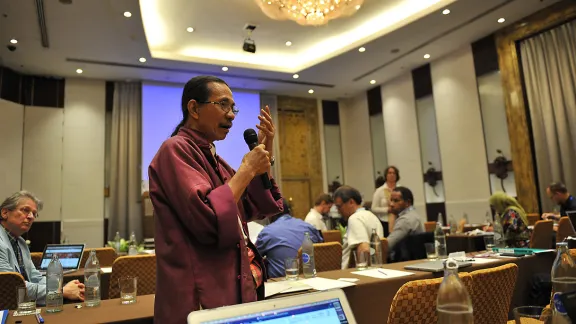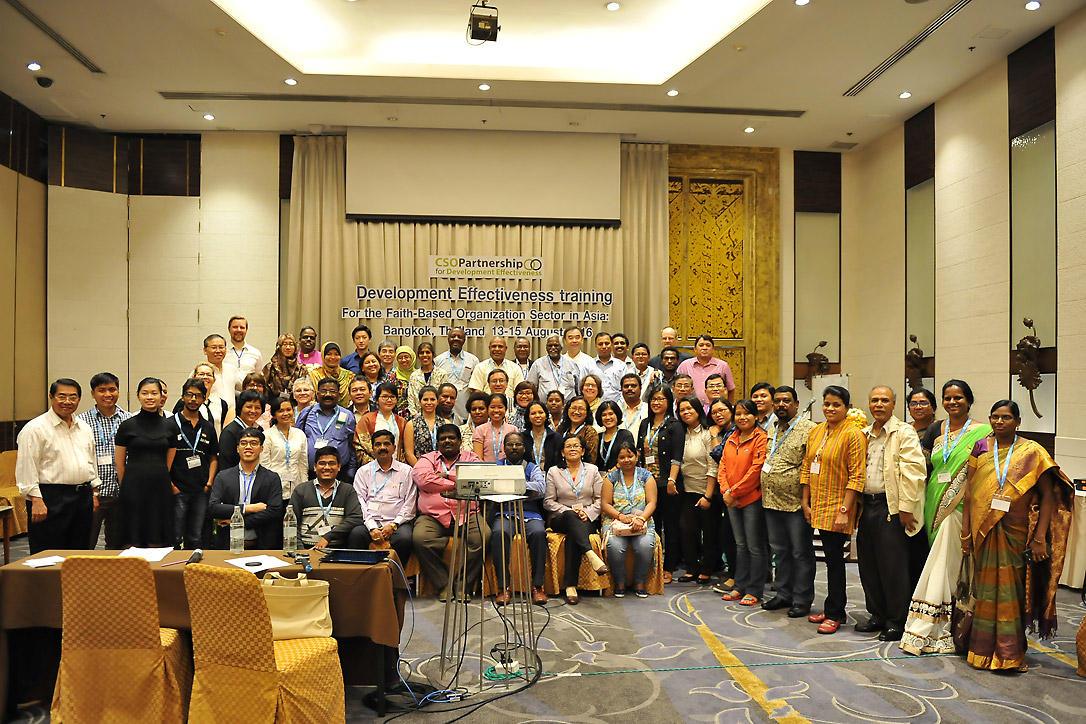
Pracha Hutanuwatra, program director at the International Network of Engaged Buddhists, invited participants at the SDG forum in Bangkok to redefine what is considered important in life. Photo: LWF/A. DanÃelsson
Public forum on Sustainable Development Goals in Bangkok brings together religious organizations and civil society
(LWI) - The Lutheran World Federation and ACT Alliance jointly organized a public forum in Thailand's capital, Bangkok, on the involvement of faith-based organizations and civil society in implementing the United Nations Sustainable Development Goals.
The objective of the 15 August meeting was to raise awareness about the SDGs, open up discussion on the 17 global goals agreed for implementation until 2030, map out ongoing work, and foster relationships among the churches, other faith groups and civil society.
In June 2016 the LWF Council called for awareness raising about the SDGs in the Lutheran communion and encouraged member churches to lobby stakeholders, such as governments and private partners, “to mobilize resources toward full funding of the SDGs." Many of LWF's churches already have put in place strategies and processes to eradicate hunger and poverty, ensure quality education, decent work and economic growth, and promote gender equality, among other targets.
Engaging constructively with positive forces
Representatives of three religions, Buddhism, Christianity and Islam spoke at the beginning of the meeting, offering their faith perspectives on the SDGs.
Rev. Dr Fidon Mwombeki, director of the LWF Department for Mission and Development, said churches should not just focus on doing advocacy but should also actively engage in development work.
The churches should advocate on behalf of others, but they also need to be involved in direct delivery to meet the needs of those who are hungry, thirsty, naked, homeless and sick. Because true diakonia means not leaving anyone behind.
"The churches should advocate on behalf of others, but they also need to be involved in direct delivery to meet the needs of those who are hungry, thirsty, naked, homeless and sick. Because true diakonia means not leaving anyone behind," Mwombeki noted.
Atallah Fitzgibbon, policy and strategy manager at Islamic Relief Worldwide spoke on the topic of eradicating poverty. He discussed how the ethical guidelines on redistributing wealth in Islam are relevant for the SDGs, and how joint partnership of different faith-based organizations contributes to a deepened understanding of sustainable development.
Pracha Hutanuwatra, program director at the International Network of Engaged Buddhists, underlined that one of the things needed was a redefinition of what is considered important in life. He leads the Ecovillage Transition Asia initiative that brings together like-minded individuals and groups to address the urgent ecological, social and spiritual crises in the region.
Rev. Dr Simone Sinn, LWF's study secretary for Public Theology and Interreligious Relations responded to the three presentations by drawing out a connecting theme. "This is what faith is about: engaging constructively with positive forces in our societies, joining hands, and at the same time not being shy to raise critical questions," she said.
Sinn added that different faith communities need to collaborate, learn from one another and thus strengthen their witness. She emphasized that this was a time to put the needs of the most vulnerable people first, and one important step would be to have the different faith groups coming together in implementing the SDGs.
Mapping ongoing work and collaboration
An important part of the meeting was a briefing on networks and platforms in the region that are related to the SDGs. A mapping exercise on existing involvement in the targeted goals showed that much work and collaboration was ongoing in areas such as education, access to clean water, and promoting gender justice, especially efforts to end violence against women.
Participants agreed further work was needed to deal with environmental issues in the region. They noted collaboration among different churches and agencies was a major challenge, which could be tackled by looking at more unconventional ways of establishing partnerships. As the ultimate goal was to support people in need more efficiently, such cooperation should not be made complicated.
The meeting observed that one trend in development work was to put value in numbers yet the ultimate work is about people. As one participant put it, "We should share the stories behind the numbers."
The Sustainable Development Goals will be discussed at all four LWF regional Pre-Assemblies.

Opening discussion on the 17 sustainable development goals: participants of the public forum jointly organized by the LWF; in Thailand's capital, Bangkok. Photo: LWF/A. Daníelsson
The Twelfth Assembly will be held in Windhoek, 10-16 May 2017. Around 800 participants expected at the event that will include a commemoration of the 500 years of the Reformation. The Assembly is LWF’s highest-decision making body, convening delegates from all the member churches every six to seven years. The Eleventh Assembly was held in July 2010 in Württemberg, Germany. Prior to the Assembly four regional Pre-Assemblies will be held and Bangkok, Thailand; Paramaribo, Suriname; Malmö, Sweden and Johannesburg, South Africa.


